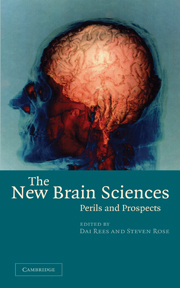Book contents
- Frontmatter
- Contents
- List of contributors
- Part I Introduction: the new brain sciences
- Part II Freedom to change
- 1 Do we ever really act?
- 2 The definition of human nature
- 3 Consciousness and the limits of neurobiology
- 4 Mind metaphors, neurosciences and ethics
- 5 Genetic and generic determinism: a new threat to free will?
- Part III Neuroscience and the law
- Part IV Stewardship of the new brain sciences
- Part V Conclusion
- References
- Index
1 - Do we ever really act?
Published online by Cambridge University Press: 08 August 2009
- Frontmatter
- Contents
- List of contributors
- Part I Introduction: the new brain sciences
- Part II Freedom to change
- 1 Do we ever really act?
- 2 The definition of human nature
- 3 Consciousness and the limits of neurobiology
- 4 Mind metaphors, neurosciences and ethics
- 5 Genetic and generic determinism: a new threat to free will?
- Part III Neuroscience and the law
- Part IV Stewardship of the new brain sciences
- Part V Conclusion
- References
- Index
Summary
WHAT IS REDUCTIONISM?
Reductionism comes in two phases. First, there is the monistic move where we explain a great range of things as only aspects of a single basic stuff. Thus, Thales says that all the four elements are really just water. Again, Nietzsche says that all motives are really just forms of the will to power, and Hobbes says that mind and matter are both really just matter. Second, there can follow the atomistic move – made by Democritus and the seventeenth-century physicists – which is slightly different. Here we explain this basic stuff itself as really just an assemblage of ultimate particles, treating the wholes that are formed out of them as secondary and relatively unreal. (I have discussed the various forms of reductionism more fully in Midgley (1995).)
Both these drastic moves can be useful when they are made as the first stage towards a fuller analysis. But both, if made on their own, can be absurdly misleading. It is pretty obvious that Nietzsche's psychology was oversimple. And, if we want to see the shortcomings of atomism, we need only consider a botanist who is asked (perhaps by an archaeologist) to identify a leaf. This botanist does not simply mince up her leaf, put it in the centrifuge and list the resulting molecules. Still less, of course, does she list their constituent atoms, protons and electrons.
- Type
- Chapter
- Information
- The New Brain SciencesPerils and Prospects, pp. 17 - 33Publisher: Cambridge University PressPrint publication year: 2004
- 1
- Cited by



